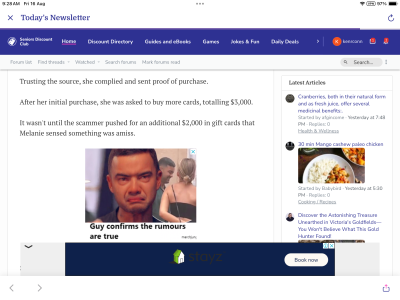Expat falls victim to a WhatsApp impersonation scam: 'I felt like a huge i****'
By
Danielle F.
- Replies 18
In today's digital age, scams have become increasingly sophisticated.
Even the most vigilant people could fall prey to deceptive tactics.
This was the unfortunate reality for an American expat living in Sydney, who learned a hard lesson about the perils of online communication.
Her story is a cautionary tale, especially for those who are not familiar with modern-day scams.
Texas native Melanie Albert has been enjoying her life in Sydney since 2019.
She was six weeks into her new job as an assistant manager when she received what seemed to be a routine email from her boss.
The email that came through her work account requested her contact number on WhatsApp.
With the sender's details matching her employer's information, Melanie provided her information.
After receiving Melanie’s WhatsApp information, the person immediately asked her to purchase a $500 Apple gift card from Woolworths with the promise of reimbursement.
Trusting the source, she complied and sent proof of purchase.
After her initial purchase, she was asked to buy more cards, totalling $3,000.
It wasn't until the scammer pushed for an additional $2,000 in gift cards that Melanie sensed something was amiss.
She called the WhatsApp number, which immediately sent her a voicemail.
'I am in meetings at the moment. Kindly text; I can't take calls,' the voicemail said.
'I will reimburse you back on all expenses as soon as I am done here.'
With only $91 left in her account, she told the number that she was almost out of money.
The scammer only replied with an emoji.
She contacted her actual boss, only to discover she had been scammed.
The initial email had a subtle, unnoticeable typo, a typical red flag in scam emails.
'What happened made me feel down about myself. Scammers are getting smarter.'
Melanie reported the incident to the police and her bank, but the chances of recovering her money were slim.
According to the bank's investigation, since she made the purchases herself, they could not refund her money.
Scams similar to these have been prevalent in Australia.
Data from the National Anti-Scam Centre revealed that Australians lodged over 601,000 scam reports in 2023.
These reports marked an 18.5 per cent increase from the previous year.
Investment scams topped the list with $1.3 billion in losses, followed by remote access scams and romance scams.
To recover from the scam, Melanie started a GoFundMe page and received an advance payment from her employer.
Her experience is a reminder that scams can happen to anyone—regardless of age or background.

What are your common telltale signs for scams? How do you keep yourselves protected from advanced scam tactics? Share your advice with us in the comments section below.
You can also read more about scams and prevention in the SDC Forum's Scam Watch.
Even the most vigilant people could fall prey to deceptive tactics.
This was the unfortunate reality for an American expat living in Sydney, who learned a hard lesson about the perils of online communication.
Her story is a cautionary tale, especially for those who are not familiar with modern-day scams.
Texas native Melanie Albert has been enjoying her life in Sydney since 2019.
She was six weeks into her new job as an assistant manager when she received what seemed to be a routine email from her boss.
The email that came through her work account requested her contact number on WhatsApp.
With the sender's details matching her employer's information, Melanie provided her information.
After receiving Melanie’s WhatsApp information, the person immediately asked her to purchase a $500 Apple gift card from Woolworths with the promise of reimbursement.
Trusting the source, she complied and sent proof of purchase.
After her initial purchase, she was asked to buy more cards, totalling $3,000.
It wasn't until the scammer pushed for an additional $2,000 in gift cards that Melanie sensed something was amiss.
She called the WhatsApp number, which immediately sent her a voicemail.
'I am in meetings at the moment. Kindly text; I can't take calls,' the voicemail said.
'I will reimburse you back on all expenses as soon as I am done here.'
With only $91 left in her account, she told the number that she was almost out of money.
The scammer only replied with an emoji.
She contacted her actual boss, only to discover she had been scammed.
The initial email had a subtle, unnoticeable typo, a typical red flag in scam emails.
'I felt like a huge i****. You always expect it to be an older person falling for a scam. It was shocking because I didn't pick up on it,' Melanie shared.'What happened made me feel down about myself. Scammers are getting smarter.'
According to the bank's investigation, since she made the purchases herself, they could not refund her money.
Scams similar to these have been prevalent in Australia.
Data from the National Anti-Scam Centre revealed that Australians lodged over 601,000 scam reports in 2023.
These reports marked an 18.5 per cent increase from the previous year.
Investment scams topped the list with $1.3 billion in losses, followed by remote access scams and romance scams.
To recover from the scam, Melanie started a GoFundMe page and received an advance payment from her employer.
Her experience is a reminder that scams can happen to anyone—regardless of age or background.
Key Takeaways
- Melanie Albert, an American expat living in Sydney, was scammed out of $3,000 in a gift card fraud after receiving a deceptive email from a scammer posing as her manager.
- Following instructions from the scammer, Ms Albert purchased several Apple gift cards at her local Woolworths and was promised to be reimbursed afterwards.
- After realising she had been scammed, Ms Albert was left financially drained of her savings.
- Despite reporting the incident to the police and her bank, her dispute claim with the bank was unsuccessful, and she may not recover her losses.
You can also read more about scams and prevention in the SDC Forum's Scam Watch.









